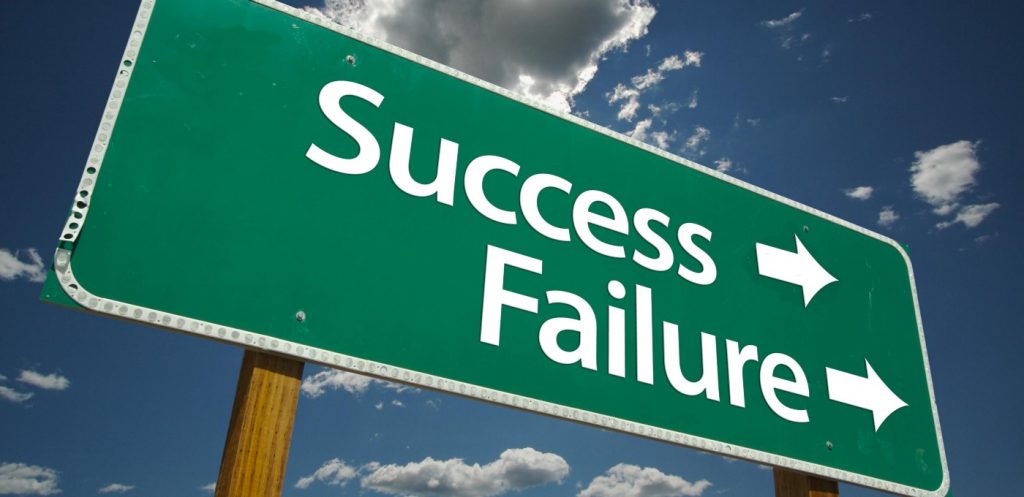
How comfortable are you with failure?
Would you say it’s something that you embrace or intentionally pursue?
Have you failed much?
Or perhaps a way Jeff Bezos might ask is—
Are you failing ENOUGH to succeed?
Fail and fail again
You know the phrase, “If at first you don’t succeed, try and try again?”
It’s a powerful way of thinking about failure because it emphasizes persistence like this quote from Elon Musk—
The first launch I was picking up bits of rocket near the launch site, which was a bit sad, but we learned with each successive flight. And we were able to eventually with the fourth flight in 2008 reach orbit, and that was also with the last bit of money that we had.
This notion to “try and try again” is exemplified by the common example of Thomas Edison’s 10,000 experiments to invent the light bulb.
It’s a “resourceful” way of thinking about failure but what I saw from Jeff Bezos was FAR MORE valuable to me.
Use Failure
See, the traditional way of thinking about failure is it’s to be avoided at all cost.
So even most highly capable people avoid taking on goals, or even just taking actions, that are likely to fail.
Those who are focused on doing new and important things are much more “embracing” of failure.
They are in a category of people who “overcome” failure or “accept” it as part of going after and achieving hard goals.
But what I saw from Jeff was a different lens on failure altogether.
Rather than seeing failure is the OPPOSITE to success, see it is THE path.
The above image well captures this because rather than seeing success and failure are two different roads in opposite directions, you see the signs for failure and success run in the same direction.
It’s like a baby learning to walk—Standing up and failing over and over is merely the process that leads to success.
Double your failure rate
Builder of IBM, Thomas Watson, famously said, “If you want to increase your success rate, double your failure rate.”
This well encapsulates Jeff Bezos’ strategy for using failure.
And this clip from Jeff is one that I find best captures his unique lens for how he’s used failure to fantastically accelerate growth at Amazon—
You see the punchline is Jeff laughing about his “billions of dollars of failures at Amazon.”
But it’s what he says before this that best captures his strategy of using failure—
And if you’re going to take bold bets, they’re going to be experiments. And if they are experiments, you don’t know ahead of time whether they’re going to work. Experiments are by their very nature prone to failure. But big successes, a few big successes, compensate for dozens and dozens of things that didn’t work. So you know, bold bets like AWS, Kindle, Amazon Prime, our third party seller business, all of those things are examples of bold bets that did work. And they pay for a lot of experiments.
You see experimenting most defines Jeff’s lens on failure.
Listen to Jeff talk about Amazon getting big, fast and he sounds less like an executive and more like an inventor, as you might imagine Thomas Edison would have described his workshop.
Jeff’s genius in the earlier years at Amazon wasn’t just his focus on experimenting, innovating, inventing.
In building a culture of experimenting, Jeff built a workshop for INFINITELY scaling Amazon.
Are you failing enough?
I perceive that this might be the most transformational Principle in the program on Jeff Bezos and Elon Musk.
Because it powerfully “reframes” failure, it can quickly get you thinking about your goals and actions differently.
And here failure doesn’t have to be this big “thing.”
It might be as simple as making more calls or having more meetings that fail to produce the results you want.
But on a grander scale, yes, you can have a great life and you can achieve a lot without failing.
Yet unless you’re failing you never test the limits of what’s possible for you, let alone experiment in making these things possible.
Does this make sense to you?
If you were to upgrade the way you think about failure, would more be possible for you?
Might it perhaps lead you to make more experiments and achieve more too?
There’s lots more on this in this program on rocketing to the top like Jeff and Elon, where just on this page you can see tons of these ideas too.